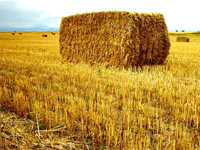Rapeseed and sugar cane are out, making way for wood, straw and curdled milk to play key roles as future biofuel energy sources that would not starve the planet by taking over land need for food.
German Chancellor Angela Merkel was on hand Thursday with the heads of automakers Daimler and Volkswagen to inaugurate what was billed as the world's first refinery of "second generation" biofuels in the eastern city of Freiberg.
Merkel hailed the "hand-in-hand work by the political, economic and scientific sectors."
The Choren group hopes to produce 18 million litres of biodiesel carburant there each year using wood residues.
Its project has high-profile backing from Anglo-Dutch energy giant Shell in addition to the two world-class German auto manufacturers.
Matthias Wissmann, head of the German automobile manufacturers association VDA, was also enthused by the "new age of biofuels" in which he hoped Germany would take the lead.
What are known as second generation biofuels aim to reduce carbon dioxied emissions while also leaving cropland available to grow food that is increasingly in demand and becoming significantly more expensive.
Cereals therefore are no longer on the biofuel menu. German projects have focused on using wood, straw, weeds or leftover milk rejected by the agrofood industry.
Producing a litre of a second generation biofuel requires three to four times less land than a litre of bioethanol, Choren says.
The new products, dubbed BTL for biomass to liquid, also pose fewer problems for existing motors, which is important for Germany because it recently made a false start with a fuel that millions of vehicles could not use in the end.
Eckhard Dinjus, director of Karlsruhe's Institute for Chemical Technology and Polymer Chemistry, told AFP his unit had come up with a motor fuel "that can be used immediately by any car, either pure or diluted."
If true, it would be good news for fans of biofuels that were crushed when it emerged that early efforts could have the disastrous side effect of starving populations in poor countries by taking up land otherwise needed for food.
Many experts nonetheless reserve judgement on the new products and point to several drawbacks.
Refineries for the new fuels "are exhorbitantly expensive," noted Frank Bruenhing of the German Federation for Biofuels.
"Choren wants to build one with a capacity of 200,000 tonnes at an estimated cost of one billion euros (1.6 billion dollars), compared with 40 million euros for a similar facility using colza (rapeseed)."
In addition, he told AFP there was "a problem of raw materials. Wood is also rare so more would have to be planted and that would take up land."
Because the new biofuels are still under development, some hiccups were also to be expected along the way, said Christian Hey, an independent expert who advises the German government.
"This refinery in Freiberg is a prototype, we must wait for it to begin operation to see what kinds of technical problems might crop up," he told AFP.
"The second generation of biofuels will be mature in 2012-2014 at the earliest. Thinking it will go any faster is an illusion."
The fuels will also have to be economically viable, currently not the case for the wood-based biodiesel, which has a production price of about one euro per litre.
Choren is nonetheless ready to build a full-sized production plant near the Polish border that would crank out 250 million litres per year.
But the decision is not risk-free. German tax exemptions for biofuels that are more or less essential to their success are due to expire at the end of 2015.

